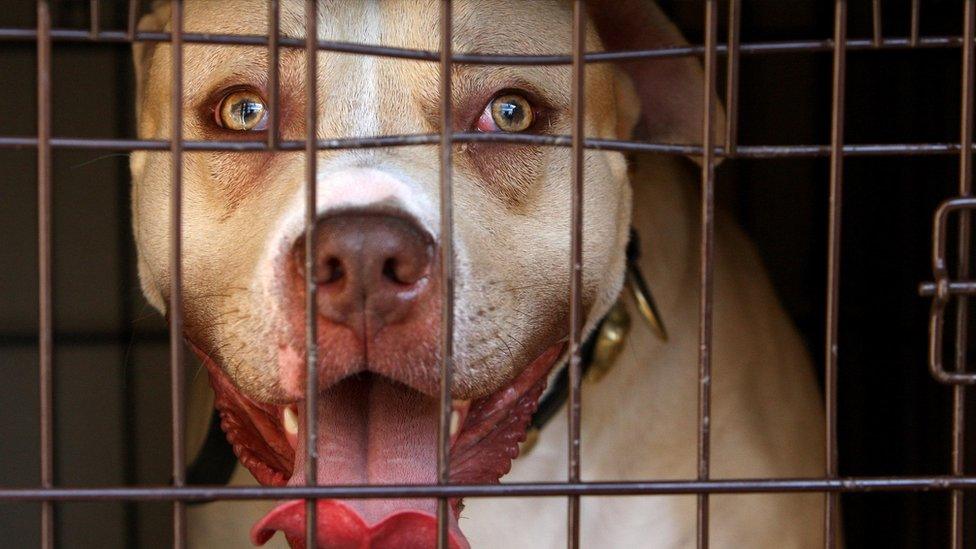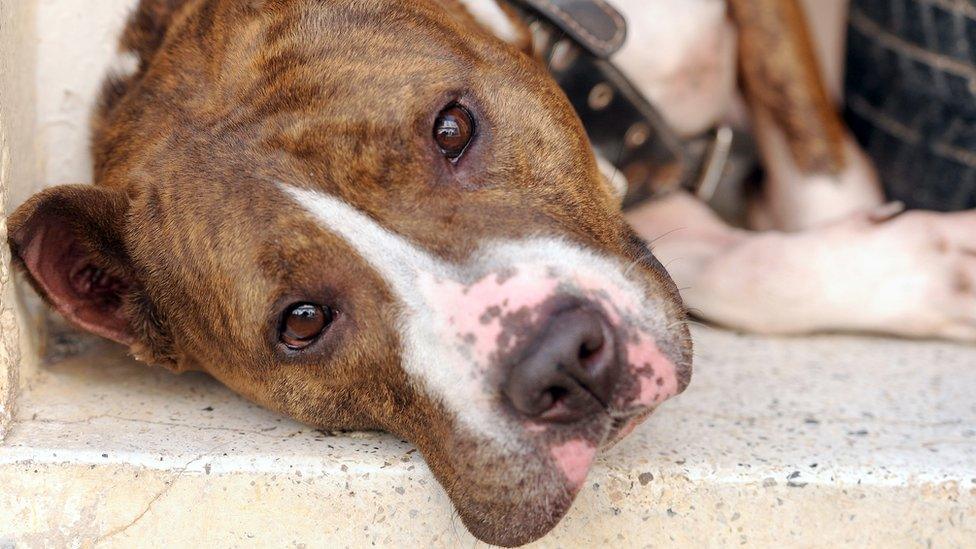Dog attack powers 'not being used'
- Published

The increased powers to deal with dog attacks were introduced in 2014
Powers introduced to curb dog attacks are not being used by the authorities, a Freedom of Information request by the Victoria Derbyshire show suggests.
Some 77% of the 311 councils in England, Scotland and Wales that responded had not issued any Community Protection Notices (CPN), which demand owners take steps to prevent attacks.
Hospital admissions from dog attacks have risen by 21% over five years.
The Local Government Association said notices were only one control method.
The CPNs, also known as Dogbos, were introduced in 2014 to give police and local authorities more powers to demand irresponsible dog owners took steps to control their animals' behaviour and prevent attacks before they occurred.
The orders are usually issued to deal with minor incidents, such as when a dog has shown it is capable of aggression. They order the responsible person to stop doing something, such as letting the dog into children's play areas, or take action such as ensuring their pet is muzzled.
Injuries rising
Only 43 out of the 311 councils who responded to the Freedom of Information request have issued the orders, handing out at least 127 in total. Twenty-seven said the orders were not available or not applicable and two refused to issue them on the grounds of time taken. Some 87 councils did not respond.
Fewer than half of the police forces we contacted could state whether they had issued any CPNs. Of the 18 forces that did give us information, only four said they had issued one.
Figures from NHS England show that in 2011-2013 there were 6,317 admissions for dog bites or injuries, rising to a record high of 7,673 in 2015-2016, an increase of 21.47%.
Almost a quarter of these (24%) were children.

'I was screaming and screaming for help'
'My three-year-old niece was attacked by five dogs'
Sandra McKevitt's niece Ella, three, was mauled by five XL American bulldogs who broke through a fence in her garden in Liverpool in May.
"One dog bit her on the leg, then one on the shoulder and you could see the blood pouring, they just wouldn't leave her alone.
"One of my neighbours jumped over and started banging and shouting to distract them and it worked.
"One dog had her by the jaw at one point and I was banging on his head. I tried to open his jaw and she fell out and they were all jumping on her.
"The paramedic who came was off work sick with shock afterwards.
"An air ambulance took her to hospital and she endured seven hours of theatre. She still has to go back and may need surgery on her scars. She's having to see a psychologist and psychiatrist.
"There were my neighbour's dogs, you could hear them barking. He was breeding them and selling the puppies for £5,000 each. I was shocked to find out they weren't classified as dangerous dogs.
"They were all destroyed and the puppies given to an animal charity. He's in prison for 18 months. I don't think it's long enough."

In the past five years there has been a 37% drop in both the number of cases against owners, falling from 805 to 511, and the number of convictions, from 593 to 374, figures from the Ministry of Justice show.
But our research found there was some confusion over whose responsibility it was to issue the orders.
Some councils, including Merseyside and Mid Suffolk, said it was down to the police, while others worked in tandem with forces.
Others, like North Devon, said they informed police once they were issued.
'Awareness important'
Bill Lambert, from the Kennel Club, said it was disappointing the legislation was not being used more, as in most cases whenever a bite occurred, the dogs had been brought to the notice of the authority beforehand.
"Harsh penalties after the event do not prevent it happening," he said.
"The local authority might find it a difficult issue to address and we want the local authorities and the police to work together. It's not been around that long yet and awareness is important. They are tools that can be used."
The Local Government Association said CPNs were usually issued following a written warning, and the possibility of one was an effective way of changing behaviour in some cases.
Improved community engagement, orders controlling behaviour in public spaces - such as ensuring dogs are kept on leads in certain areas - and civil injunctions are also used.
A spokesman said: "Crime and anti-social behaviour varies from place to place and that is why councils, who know their areas best, are responding in different ways using different tools and approaches."
A spokesman for the Department for Environment, Food and Rural Affairs (Defra) said the Dangerous Dogs Act gave police and local authorities power to intervene early with owners.
Watch the Victoria Derbyshire programme on weekdays between 09:00 and 11:00 on BBC Two and the BBC News Channel.
- Published13 August 2016

- Published13 April 2016
